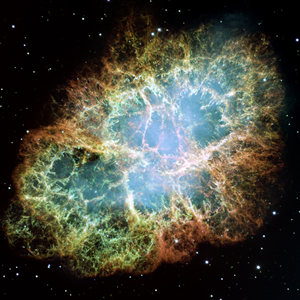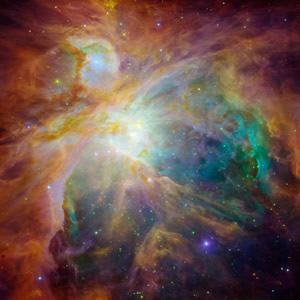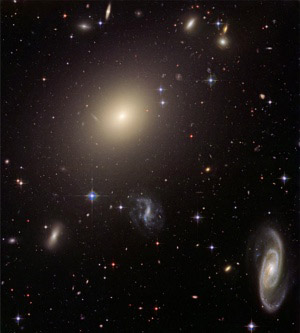The Fulfillment of Time:
When Creation in Genesis Meets Redemption in Jesus
For Sunday January 3, 2010
Lectionary Readings (Revised Common Lectionary, Year C)
Jeremiah 31:7–14 / Sirach 24:1–12
Psalm 147:12–20 / Wisdom of Solomon 10:15–21
Ephesians 1:3–14
John 1:1–18
The end of the old and the beginning of the new year invite us to contemplate the passage of time. Where did the past year go? What might the future hold? The readings from John and Paul for this week reach back to the beginning of all space and time, and then stretch forward to their fulfillment in cosmic redemption. Despite the bleak headlines of the nightly news, they remind us that Christians are the ultimate optimists.
You don't have to read far in John to notice striking contrasts between his gospel and the gospels of Matthew, Mark, and Luke. The three synoptics portray Jesus as a hometown carpenter, rebel rabbi and itinerating preacher. John borrows a Greek philosophical term to describe Jesus as the Logos of God. He employs grand metaphysical themes like light and darkness, life and death, time and eternity. He uses metaphors to describe Jesus (bread of the world, living water, the good shepherd), whereas Matthew, Mark and Luke focus on literal events. The synoptics organize particular and pithy sayings of Jesus into collections or narratives like the Sermon on the Mount; in John Jesus gives long theological discourses (chapters 13–17).
 |
Hubble Space Telescope image of the Crab Nebula. |
The first sentence in John echoes the first sentence of the entire Bible to draw an unmistakable parallel between two unrelated texts that are separated by two thousand years. The elegant words of Genesis 1:1 read, "In the beginning God created the heavens and the earth." John begins his gospel, "In the beginning was the Word." Why does John do this? What is he saying to us? Beyond the obvious literary affinity, what's the deeper connection between the Jesus of John and the God of Genesis?
The prologue of John 1:1–18 makes two connections between Jesus and Genesis, and it's not too much to say that these two connections form the sum and substance of the entire Christian story. John links Genesis and Jesus to connect creation and redemption. Jesus embodies the revelation of the invisible God and enacts the redemption of the material creation. He is the infinite and eternal Logos who entered time and became finite flesh. Just as God's glory inhabited the tabernacle and temple in the Old Testament, his glory "tabernacled" in the fleshly body of Jesus. In Jesus God created the world, says John, and in Jesus God redeems the world.
Paul makes a similar theological connection with equal literary flourish. As any seminarian who has struggled to learn Greek knows, in the original Greek text, Ephesians 1:3–14 is one long, ponderous sentence that piles clause upon clause. Mrs. Tilley, my ninth grade English teacher, would give Paul a failing grade for grammar. Different translations of the Bible struggle to punctuate Paul's syntax. But like John, beyond his tortured prose, Paul connects creation and redemption.
Whereas John and Genesis begin at the beginning of creation, Paul imagines a scenario "before the creation of the world" (1:4). Although this sounds like science fiction, I take his words at face value. The universe is about 14 billion years old, and even though that's an unimaginably large number, it's still a finite number. What came "before" the beginning of space and time? And when in the distant but certain future the universe flies apart from a continued expansion of the Big Bang, or collapses into a Big Crunch from the forces of gravity, what will be its end?
 |
Hubble and Spitzer Space Telescopes image of the Orion Nebula. |
Our best scientific minds are exploring these ideas. At the Large Hadron Collider, the world's largest, newest and highest energy particle smasher buried underground near Geneva, physicists are conducting many experiments. One of them simulates the Big Bang that separated the "before" and "after" of all space and time. As described by the New York Times, scientists are conducting a "15-year, $10 billion quest to recreate laws and particles that prevailed just after the Big Bang, when the universe was less than a trillionth of a second old."
For Paul, the chronological march of clocks and calendars started by the Big Bang is going somewhere rather than nowhere; he says that time itself is progressing toward a "fulfillment." He tells the Ephesians that the "mystery of God's will," hidden in eternity past, is revealed in the first century Jesus. Creation will receive its redemption when God "brings all things in heaven and on earth together under one head, even Christ."
Paul's remarkably comprehensive vision embraces all space and time. The future redemption of the original creation is so central to his thought that he repeats these ideas in nearly identical language in four additional epistles besides Ephesians. It's like Paul had a computer and did a cut-and-paste of his thoughts to five different churches.
The ultimate destiny of all creation is liberation and freedom, adoption and redemption. The scale and scope of this future hope encompasses "the whole creation" (Romans 8:12–25; cf. 1 John 2:2). God "created all things in heaven and on earth" (Colossians 1:16). He seeks the worship of all "things in heaven, and things in earth, and things under the earth" (Philippians 2:9–11). He will "reconcile to himself all things, whether things on earth or things in heaven" (Colossians 1:20). Since He will sum up or bring together "all things in heaven and on earth" (Ephesians 1:10), then of course God delights in bestowing his fatherly favor on "the whole human family in heaven and on earth" (Ephesians 3:15). Paul's incremental logic is palpable — redemption is the destiny of each person, every nation, all creation, and the whole cosmos — not only on earth but "under the earth and in heaven."
 |
Galactic cluster image by the Hubble Space Telescope. |
God was in Christ, says Paul, "reconciling the cosmos to himself" (2 Corinthians 5:19). The creation of Genesis will meet its redemption in Jesus. This is an affirmation of religious faith, of course, and not an assertion of scientific fact. But that doesn't mean we should relegate this scenario to fiction, or believe that science alone can fully describe the meaning of the cosmos. In fact, the connection between creation and redemption has an intensely practical implication.
When the eternal Word entered time and assumed flesh, He reminded us that the material creation is inherently good. The first chapter of Genesis did this long ago, of course, poetically proclaiming seven times that all that God created was "good." But many Christians have embraced a dualism that accepts the spiritual as a superior good and rejects the material as an inferior evil. The incarnation of Jesus dispels that dualism.
Brian Wren captures this important observation in his poem Good is the Flesh:
Good is the flesh that the Word has become,
good is the birthing, the milk in the breast,
good is the feeding, caressing and rest,
good is the body for knowing the world,
Good is the flesh that the Word has become.Good is the body for knowing the world,
sensing the sunlight, the tug of the ground,
feeling, perceiving, within and around,
good is the body, from cradle to grave,
Good is the flesh that the Word has become.Good is the body, from cradle to grave,
growing and aging, arousing, impaired,
happy in clothing, or lovingly bared,
good is the pleasure of God in our flesh,
Good is the flesh that the Word has become.Good is the pleasure of God in our flesh,
longing in all, as in Jesus, to dwell,
glad of embracing, and tasting, and smell,
good is the body, for good and for God,
Good is the flesh that the Word has become.1
Between the mysteries of creation in eternity past and its future fulfillment is the present. And today's present is one that Christians embrace with enthusiastic optimism.
[1] From Good is the Flesh: Body, Soul, and Christian Faith, edited by Jean Denton (Morehouse Publishing, 2005).
Image credits: (1)–(3): stronomy-pictures.net.





